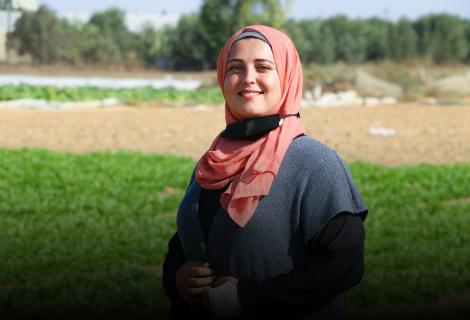ActionAid Palestine to Shed the light on the Impact of Climate Crisis on Palestinian Women

On the International Women’s Day
ActionAid Palestine (AAP) continues advocating for the right cases of Palestinian women. It takes the opportunity of International Women’s Day (IWD) that falls on 8th of March every year to highlight the achievements and challenges facing the Palestinian woman. This occasion sheds the light on the impacts of climate change on social justice. The theme of IWD 2022 is “Gender equality today for a sustainable tomorrow''.
The climate change crisis in Palestine and its impact on gender and Palestinian women is closely linked to the policies and practices of Israeli occupation that severely exacerbate this crisis and its impact particularly on women in West Bank and Gaza Strip and the absence of National polices for tackling this challenge. Palestinian women and girls working in the sector of agriculture are greatly impacted by those polices. Female framers lose their only source of income in agriculture due to draining of land, water and dangers of climate change including frost, droughts, heatwaves that damage the agricultural crops and cause food and agricultural insecurity to Palestinian households.
Israel controls water source in Palestine causing unequal water distribution and scarcity of water in Occupied Palestinian Territory(oPt). Lack of water impedes the ability of women to develop their agriculture projects and irrigate the agricultural crops during heatwave. In addition, Israel prevents Palestinian women and household from addressing problems of climate changes including lack of water, digging wells, and delivery of equipment and water tanks to many parts of Area “C” controlled by Israel in West Bank. Furthermore, the waste of Israeli settlements increases the rate of salinity in the water in the area of Jordan Valleys impeding the ability of Palestinian households to plant agricultural lands in this area. Women in Gaza Strip bear the brunt of the polluted water as 97%of water there is undrinkable due to Israeli blockade that causes the deterioration of water security. The recent Israeli aggression against Gaza exuberated the suffering of women by burning the agricultural lands and crops that woman work and bombing the stores of Argo-chemical increasing the pollution of water and soil. These practices increase the loads and responsibilities of women since housewives carry the responsibility for managing of access to water and food to their households as wells as caring for children, elderly and people with disabilities.
Aysha Abu Sninah is a Palestinian whose agricultural project is supported through AAP’s project “Valiance-Basala”, empowering women in H2 in Hebron governorate in the south of West Bank. Aysha has exacerbated suffering caused by climate change and Israeli polices that prevent her from using essential equipment needed for adapting with the climate crisis. The recent snowstorm and frost during January of 2022 damaged some of agricultural crops that Aysha grow as a source of income for her and her family. Aysha cannot dig a well in her land to irrigate her crops during summer and heatwaves due to polices of Israeli Occupation that frequently demolish wells and structures in this area. Aysha said: “there are dangers that we face in addressing the climate crisis. We could not guarantee that the well will not be demolished in case of digging it. We can not secure that equipment needed for irrigating crops will not be confiscated. The problem of the climate change is a natural problem, while the Israeli occupation further complicates it increasing the poverty of women and their inability to fulfill the needs of their families.
Khadija Abu Madi is a Palestinian young woman who runs an agricultural project supported through Valiance-Basala”’s project in H2.Khadija suffers from late rains and droughts impeding her from palnting some crops that depend on rain-fed agriculture.Khadija said that : “ the woman working in the field of agriculture suffers from climate change in Palestine as late rain and she also could not dig wells that cost too much and might be exposed to demolition. These factors imped planting some agricultural crops and Palestinian household from achieving self-sufficiency and food security which cause the loss of livelihood of Palestinian woman and increase its marginalization”.
AAP works with local and international partners to advocate for and demanding the rights of women in local and international forums through advocacy and loobying campaigns. Those campaigns essentially demand the protection of Palestinian women during the Israeli aggression against Gaza Strip and call for essentially legislating laws that protect women from GBV.AAP continues implementing many activities and programs seeking to increase the economic,political,civil and community participation of women and essentially adopting policies that ensure the inclusion of gender equality in national recovery plans after COVID-19 crisis.
Background Information
ActionAid in Palestine (AAP) is a part of global federation working for social justice and gender equality and eradicate poverty in more than 45 countries around the world. AAP started its work in Palestine in 2007 to strengthen the resilience of Palestinian People as ActionAid believes that they should enjoy their rights to freedom, justice and self-determination. AAP implements a number of programs through its engagement with communities and women and youth groups seeking to empower them and enhance their influential civil and political participation to understand their rights and undertake collective activism to address the protracted rights violations resulting from the prolonged occupation of Palestine. AAP works simultaneously to enhance their leadership capacity and knowledge to practice their citizenship in holding authorities and other duty bearers to account.
For more information, please contact
Riham Jafari
Coordinator of Advocacy and Communication in Palestine
Mobile:
+972 (0) 595242890
Office:
+972 (0) (2) 22 13 137
Email: